Comparative Analysis: Qualitative Methodologies in Psychology Essay
VerifiedAdded on 2023/06/15
|8
|2665
|346
Essay
AI Summary
This essay provides a detailed analysis of qualitative methodologies in psychology, focusing on phenomenological, grounded theory, and narrative approaches. It explores the differences and similarities between these methodologies, highlighting their practical implementation and impact on treatment advancements. The essay compares and contrasts the research focus, unit of analysis, suitability for different research issues, disciplinary origins, data collection methods, reporting of research, and conclusion formats of each approach. It concludes that qualitative methods play a strong role in psychology, offering unique perspectives on research questions and data collection, with grounded theory being particularly effective for systematic analysis and new theory development. The study material is available on Desklib, a platform offering past papers and solved assignments for students.
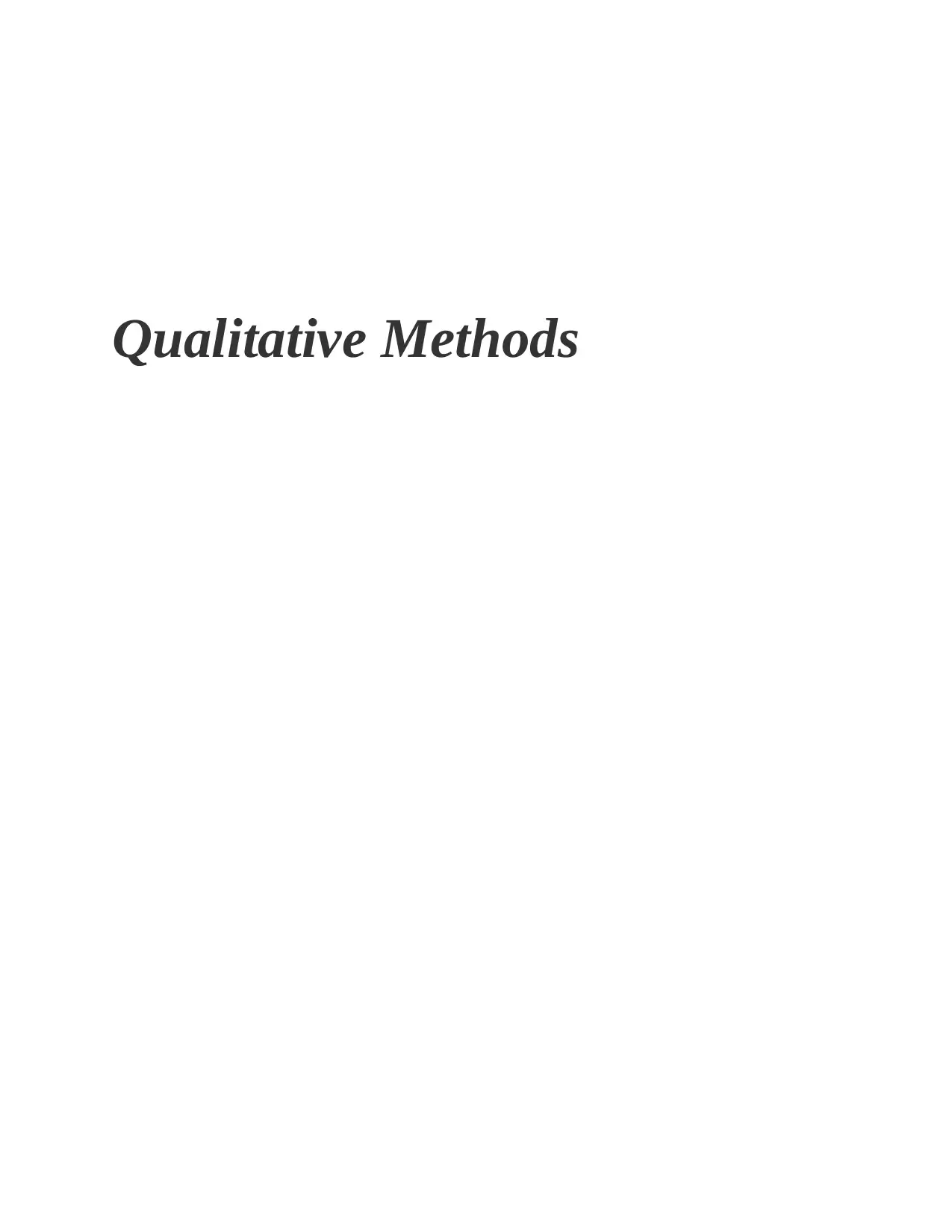
Qualitative Methods
Paraphrase This Document
Need a fresh take? Get an instant paraphrase of this document with our AI Paraphraser
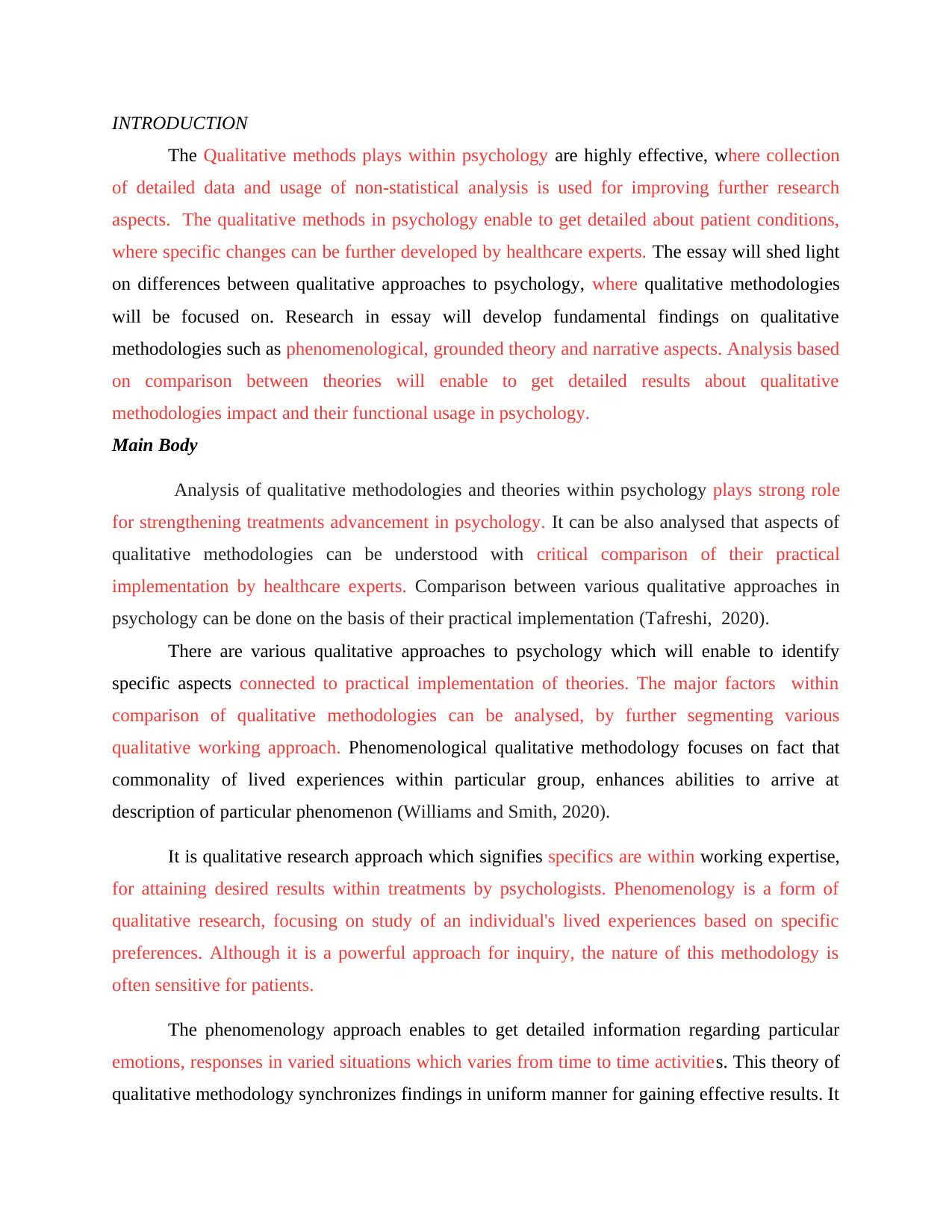
INTRODUCTION
The Qualitative methods plays within psychology are highly effective, where collection
of detailed data and usage of non-statistical analysis is used for improving further research
aspects. The qualitative methods in psychology enable to get detailed about patient conditions,
where specific changes can be further developed by healthcare experts. The essay will shed light
on differences between qualitative approaches to psychology, where qualitative methodologies
will be focused on. Research in essay will develop fundamental findings on qualitative
methodologies such as phenomenological, grounded theory and narrative aspects. Analysis based
on comparison between theories will enable to get detailed results about qualitative
methodologies impact and their functional usage in psychology.
Main Body
Analysis of qualitative methodologies and theories within psychology plays strong role
for strengthening treatments advancement in psychology. It can be also analysed that aspects of
qualitative methodologies can be understood with critical comparison of their practical
implementation by healthcare experts. Comparison between various qualitative approaches in
psychology can be done on the basis of their practical implementation (Tafreshi, 2020).
There are various qualitative approaches to psychology which will enable to identify
specific aspects connected to practical implementation of theories. The major factors within
comparison of qualitative methodologies can be analysed, by further segmenting various
qualitative working approach. Phenomenological qualitative methodology focuses on fact that
commonality of lived experiences within particular group, enhances abilities to arrive at
description of particular phenomenon (Williams and Smith, 2020).
It is qualitative research approach which signifies specifics are within working expertise,
for attaining desired results within treatments by psychologists. Phenomenology is a form of
qualitative research, focusing on study of an individual's lived experiences based on specific
preferences. Although it is a powerful approach for inquiry, the nature of this methodology is
often sensitive for patients.
The phenomenology approach enables to get detailed information regarding particular
emotions, responses in varied situations which varies from time to time activities. This theory of
qualitative methodology synchronizes findings in uniform manner for gaining effective results. It
The Qualitative methods plays within psychology are highly effective, where collection
of detailed data and usage of non-statistical analysis is used for improving further research
aspects. The qualitative methods in psychology enable to get detailed about patient conditions,
where specific changes can be further developed by healthcare experts. The essay will shed light
on differences between qualitative approaches to psychology, where qualitative methodologies
will be focused on. Research in essay will develop fundamental findings on qualitative
methodologies such as phenomenological, grounded theory and narrative aspects. Analysis based
on comparison between theories will enable to get detailed results about qualitative
methodologies impact and their functional usage in psychology.
Main Body
Analysis of qualitative methodologies and theories within psychology plays strong role
for strengthening treatments advancement in psychology. It can be also analysed that aspects of
qualitative methodologies can be understood with critical comparison of their practical
implementation by healthcare experts. Comparison between various qualitative approaches in
psychology can be done on the basis of their practical implementation (Tafreshi, 2020).
There are various qualitative approaches to psychology which will enable to identify
specific aspects connected to practical implementation of theories. The major factors within
comparison of qualitative methodologies can be analysed, by further segmenting various
qualitative working approach. Phenomenological qualitative methodology focuses on fact that
commonality of lived experiences within particular group, enhances abilities to arrive at
description of particular phenomenon (Williams and Smith, 2020).
It is qualitative research approach which signifies specifics are within working expertise,
for attaining desired results within treatments by psychologists. Phenomenology is a form of
qualitative research, focusing on study of an individual's lived experiences based on specific
preferences. Although it is a powerful approach for inquiry, the nature of this methodology is
often sensitive for patients.
The phenomenology approach enables to get detailed information regarding particular
emotions, responses in varied situations which varies from time to time activities. This theory of
qualitative methodology synchronizes findings in uniform manner for gaining effective results. It
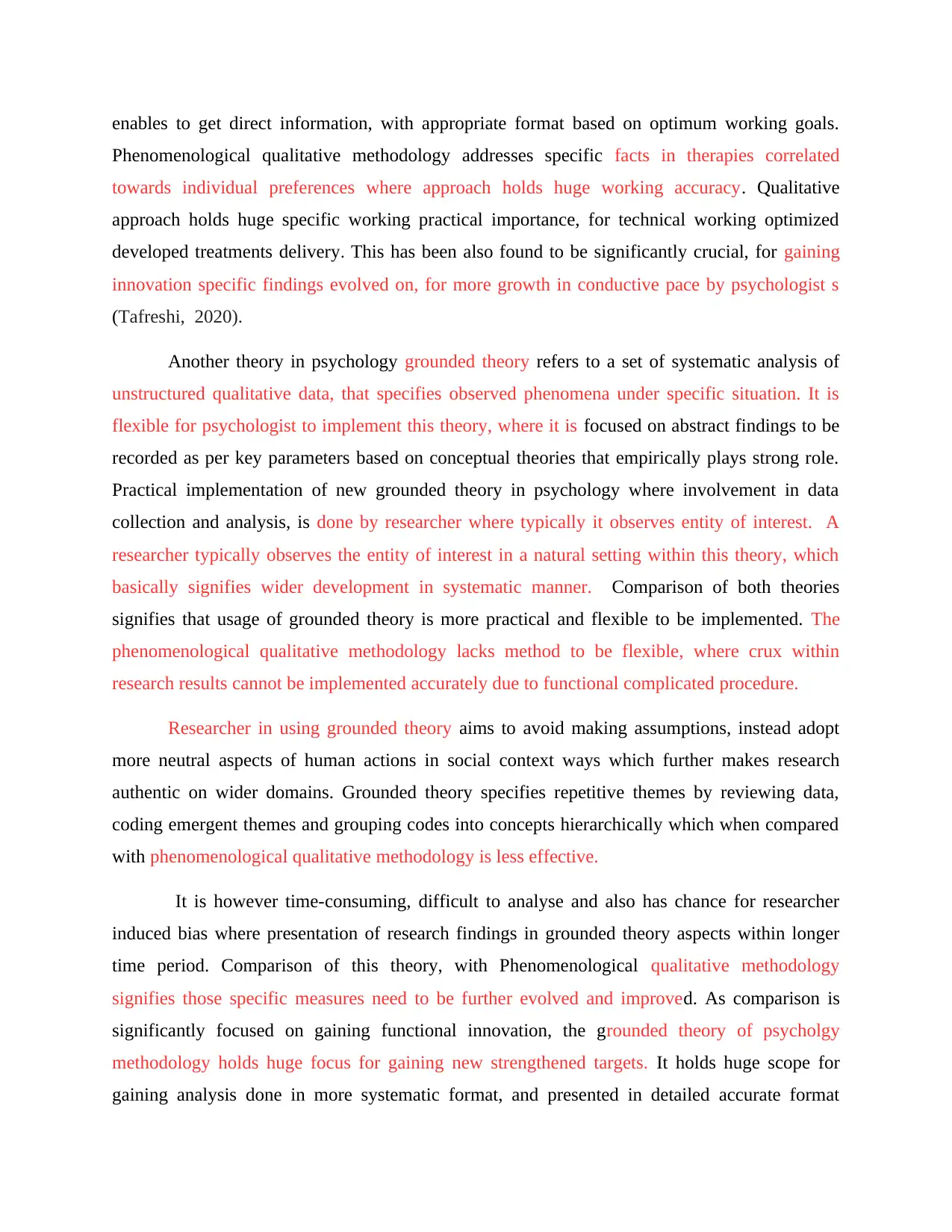
enables to get direct information, with appropriate format based on optimum working goals.
Phenomenological qualitative methodology addresses specific facts in therapies correlated
towards individual preferences where approach holds huge working accuracy. Qualitative
approach holds huge specific working practical importance, for technical working optimized
developed treatments delivery. This has been also found to be significantly crucial, for gaining
innovation specific findings evolved on, for more growth in conductive pace by psychologist s
(Tafreshi, 2020).
Another theory in psychology grounded theory refers to a set of systematic analysis of
unstructured qualitative data, that specifies observed phenomena under specific situation. It is
flexible for psychologist to implement this theory, where it is focused on abstract findings to be
recorded as per key parameters based on conceptual theories that empirically plays strong role.
Practical implementation of new grounded theory in psychology where involvement in data
collection and analysis, is done by researcher where typically it observes entity of interest. A
researcher typically observes the entity of interest in a natural setting within this theory, which
basically signifies wider development in systematic manner. Comparison of both theories
signifies that usage of grounded theory is more practical and flexible to be implemented. The
phenomenological qualitative methodology lacks method to be flexible, where crux within
research results cannot be implemented accurately due to functional complicated procedure.
Researcher in using grounded theory aims to avoid making assumptions, instead adopt
more neutral aspects of human actions in social context ways which further makes research
authentic on wider domains. Grounded theory specifies repetitive themes by reviewing data,
coding emergent themes and grouping codes into concepts hierarchically which when compared
with phenomenological qualitative methodology is less effective.
It is however time-consuming, difficult to analyse and also has chance for researcher
induced bias where presentation of research findings in grounded theory aspects within longer
time period. Comparison of this theory, with Phenomenological qualitative methodology
signifies those specific measures need to be further evolved and improved. As comparison is
significantly focused on gaining functional innovation, the grounded theory of psycholgy
methodology holds huge focus for gaining new strengthened targets. It holds huge scope for
gaining analysis done in more systematic format, and presented in detailed accurate format
Phenomenological qualitative methodology addresses specific facts in therapies correlated
towards individual preferences where approach holds huge working accuracy. Qualitative
approach holds huge specific working practical importance, for technical working optimized
developed treatments delivery. This has been also found to be significantly crucial, for gaining
innovation specific findings evolved on, for more growth in conductive pace by psychologist s
(Tafreshi, 2020).
Another theory in psychology grounded theory refers to a set of systematic analysis of
unstructured qualitative data, that specifies observed phenomena under specific situation. It is
flexible for psychologist to implement this theory, where it is focused on abstract findings to be
recorded as per key parameters based on conceptual theories that empirically plays strong role.
Practical implementation of new grounded theory in psychology where involvement in data
collection and analysis, is done by researcher where typically it observes entity of interest. A
researcher typically observes the entity of interest in a natural setting within this theory, which
basically signifies wider development in systematic manner. Comparison of both theories
signifies that usage of grounded theory is more practical and flexible to be implemented. The
phenomenological qualitative methodology lacks method to be flexible, where crux within
research results cannot be implemented accurately due to functional complicated procedure.
Researcher in using grounded theory aims to avoid making assumptions, instead adopt
more neutral aspects of human actions in social context ways which further makes research
authentic on wider domains. Grounded theory specifies repetitive themes by reviewing data,
coding emergent themes and grouping codes into concepts hierarchically which when compared
with phenomenological qualitative methodology is less effective.
It is however time-consuming, difficult to analyse and also has chance for researcher
induced bias where presentation of research findings in grounded theory aspects within longer
time period. Comparison of this theory, with Phenomenological qualitative methodology
signifies those specific measures need to be further evolved and improved. As comparison is
significantly focused on gaining functional innovation, the grounded theory of psycholgy
methodology holds huge focus for gaining new strengthened targets. It holds huge scope for
gaining analysis done in more systematic format, and presented in detailed accurate format
⊘ This is a preview!⊘
Do you want full access?
Subscribe today to unlock all pages.

Trusted by 1+ million students worldwide
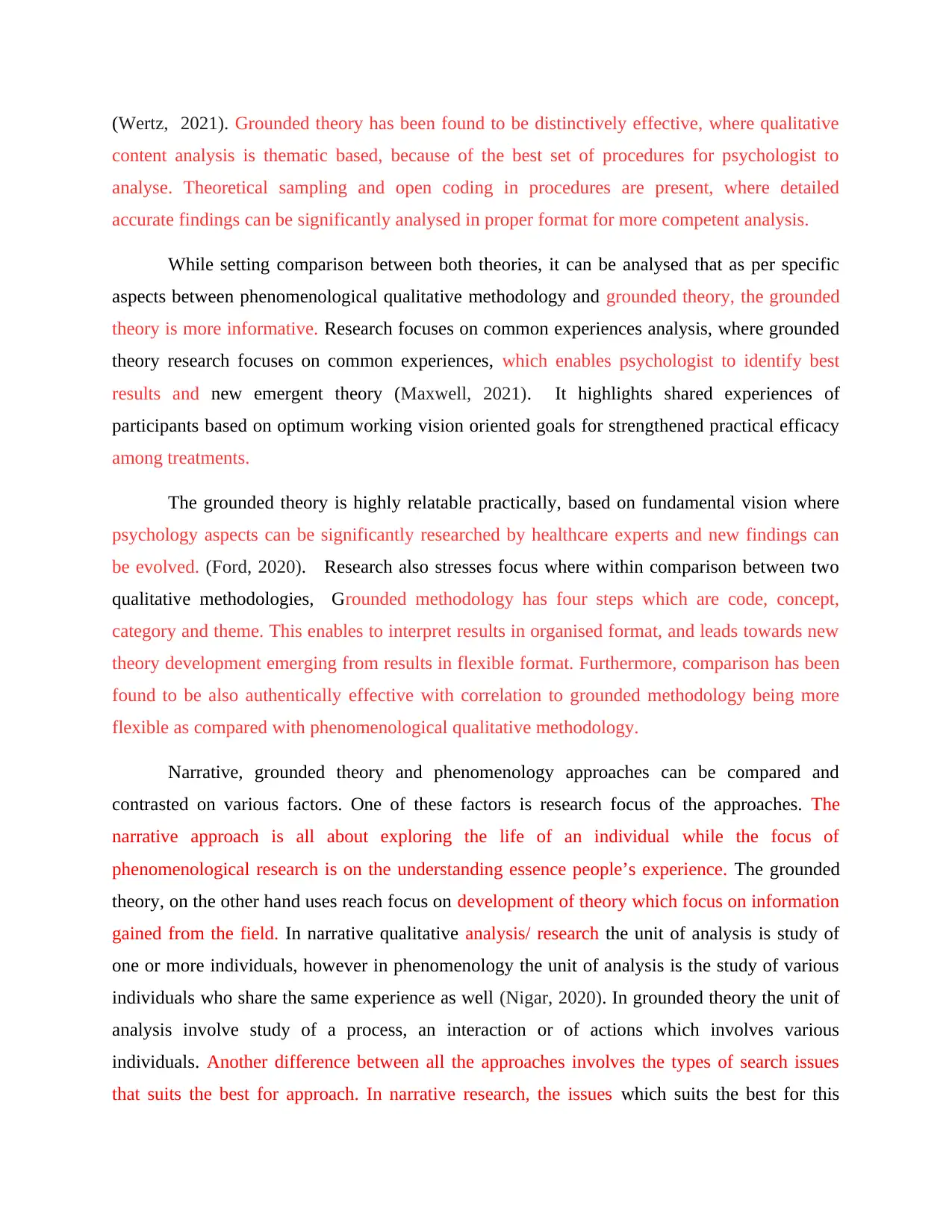
(Wertz, 2021). Grounded theory has been found to be distinctively effective, where qualitative
content analysis is thematic based, because of the best set of procedures for psychologist to
analyse. Theoretical sampling and open coding in procedures are present, where detailed
accurate findings can be significantly analysed in proper format for more competent analysis.
While setting comparison between both theories, it can be analysed that as per specific
aspects between phenomenological qualitative methodology and grounded theory, the grounded
theory is more informative. Research focuses on common experiences analysis, where grounded
theory research focuses on common experiences, which enables psychologist to identify best
results and new emergent theory (Maxwell, 2021). It highlights shared experiences of
participants based on optimum working vision oriented goals for strengthened practical efficacy
among treatments.
The grounded theory is highly relatable practically, based on fundamental vision where
psychology aspects can be significantly researched by healthcare experts and new findings can
be evolved. (Ford, 2020). Research also stresses focus where within comparison between two
qualitative methodologies, Grounded methodology has four steps which are code, concept,
category and theme. This enables to interpret results in organised format, and leads towards new
theory development emerging from results in flexible format. Furthermore, comparison has been
found to be also authentically effective with correlation to grounded methodology being more
flexible as compared with phenomenological qualitative methodology.
Narrative, grounded theory and phenomenology approaches can be compared and
contrasted on various factors. One of these factors is research focus of the approaches. The
narrative approach is all about exploring the life of an individual while the focus of
phenomenological research is on the understanding essence people’s experience. The grounded
theory, on the other hand uses reach focus on development of theory which focus on information
gained from the field. In narrative qualitative analysis/ research the unit of analysis is study of
one or more individuals, however in phenomenology the unit of analysis is the study of various
individuals who share the same experience as well (Nigar, 2020). In grounded theory the unit of
analysis involve study of a process, an interaction or of actions which involves various
individuals. Another difference between all the approaches involves the types of search issues
that suits the best for approach. In narrative research, the issues which suits the best for this
content analysis is thematic based, because of the best set of procedures for psychologist to
analyse. Theoretical sampling and open coding in procedures are present, where detailed
accurate findings can be significantly analysed in proper format for more competent analysis.
While setting comparison between both theories, it can be analysed that as per specific
aspects between phenomenological qualitative methodology and grounded theory, the grounded
theory is more informative. Research focuses on common experiences analysis, where grounded
theory research focuses on common experiences, which enables psychologist to identify best
results and new emergent theory (Maxwell, 2021). It highlights shared experiences of
participants based on optimum working vision oriented goals for strengthened practical efficacy
among treatments.
The grounded theory is highly relatable practically, based on fundamental vision where
psychology aspects can be significantly researched by healthcare experts and new findings can
be evolved. (Ford, 2020). Research also stresses focus where within comparison between two
qualitative methodologies, Grounded methodology has four steps which are code, concept,
category and theme. This enables to interpret results in organised format, and leads towards new
theory development emerging from results in flexible format. Furthermore, comparison has been
found to be also authentically effective with correlation to grounded methodology being more
flexible as compared with phenomenological qualitative methodology.
Narrative, grounded theory and phenomenology approaches can be compared and
contrasted on various factors. One of these factors is research focus of the approaches. The
narrative approach is all about exploring the life of an individual while the focus of
phenomenological research is on the understanding essence people’s experience. The grounded
theory, on the other hand uses reach focus on development of theory which focus on information
gained from the field. In narrative qualitative analysis/ research the unit of analysis is study of
one or more individuals, however in phenomenology the unit of analysis is the study of various
individuals who share the same experience as well (Nigar, 2020). In grounded theory the unit of
analysis involve study of a process, an interaction or of actions which involves various
individuals. Another difference between all the approaches involves the types of search issues
that suits the best for approach. In narrative research, the issues which suits the best for this
Paraphrase This Document
Need a fresh take? Get an instant paraphrase of this document with our AI Paraphraser
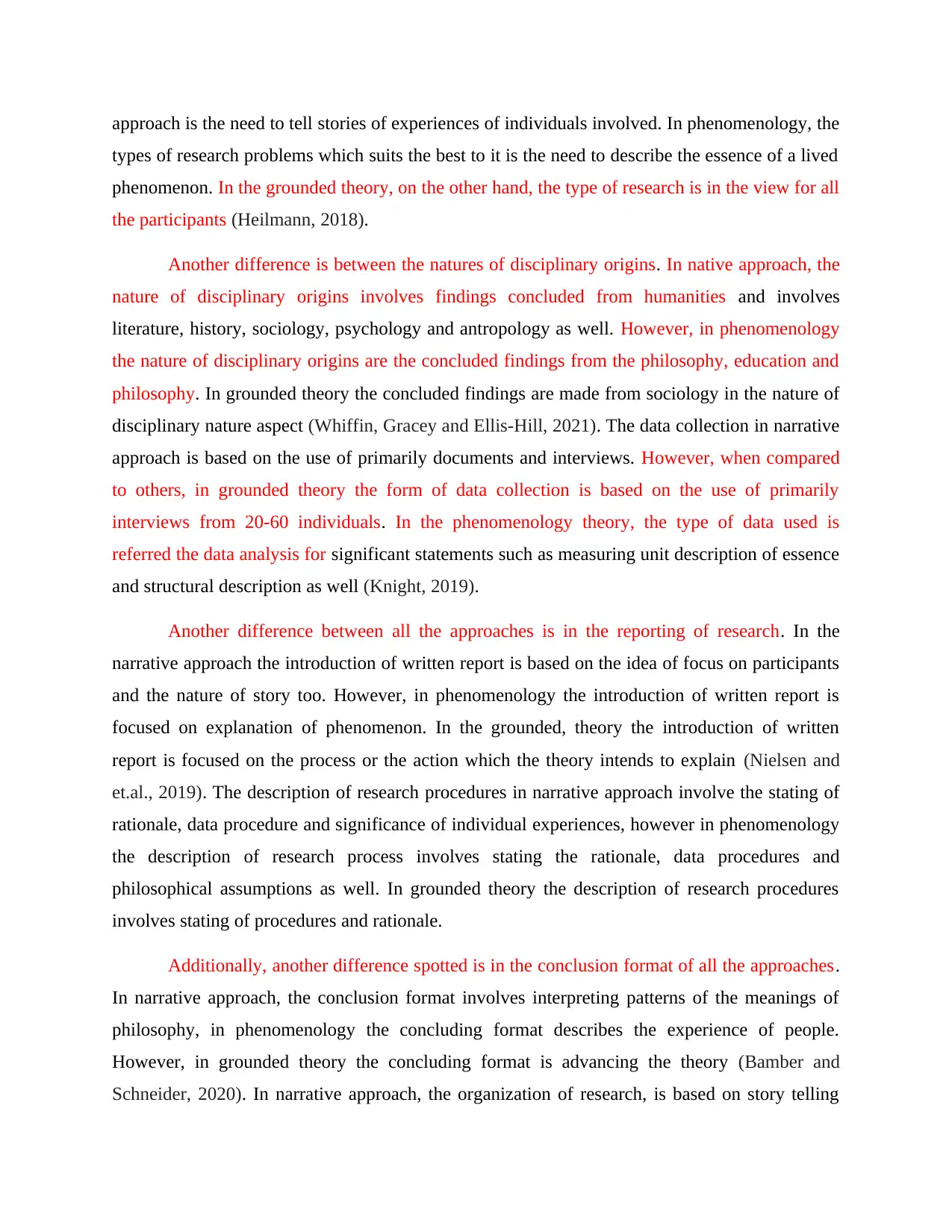
approach is the need to tell stories of experiences of individuals involved. In phenomenology, the
types of research problems which suits the best to it is the need to describe the essence of a lived
phenomenon. In the grounded theory, on the other hand, the type of research is in the view for all
the participants (Heilmann, 2018).
Another difference is between the natures of disciplinary origins. In native approach, the
nature of disciplinary origins involves findings concluded from humanities and involves
literature, history, sociology, psychology and antropology as well. However, in phenomenology
the nature of disciplinary origins are the concluded findings from the philosophy, education and
philosophy. In grounded theory the concluded findings are made from sociology in the nature of
disciplinary nature aspect (Whiffin, Gracey and Ellis-Hill, 2021). The data collection in narrative
approach is based on the use of primarily documents and interviews. However, when compared
to others, in grounded theory the form of data collection is based on the use of primarily
interviews from 20-60 individuals. In the phenomenology theory, the type of data used is
referred the data analysis for significant statements such as measuring unit description of essence
and structural description as well (Knight, 2019).
Another difference between all the approaches is in the reporting of research. In the
narrative approach the introduction of written report is based on the idea of focus on participants
and the nature of story too. However, in phenomenology the introduction of written report is
focused on explanation of phenomenon. In the grounded, theory the introduction of written
report is focused on the process or the action which the theory intends to explain (Nielsen and
et.al., 2019). The description of research procedures in narrative approach involve the stating of
rationale, data procedure and significance of individual experiences, however in phenomenology
the description of research process involves stating the rationale, data procedures and
philosophical assumptions as well. In grounded theory the description of research procedures
involves stating of procedures and rationale.
Additionally, another difference spotted is in the conclusion format of all the approaches.
In narrative approach, the conclusion format involves interpreting patterns of the meanings of
philosophy, in phenomenology the concluding format describes the experience of people.
However, in grounded theory the concluding format is advancing the theory (Bamber and
Schneider, 2020). In narrative approach, the organization of research, is based on story telling
types of research problems which suits the best to it is the need to describe the essence of a lived
phenomenon. In the grounded theory, on the other hand, the type of research is in the view for all
the participants (Heilmann, 2018).
Another difference is between the natures of disciplinary origins. In native approach, the
nature of disciplinary origins involves findings concluded from humanities and involves
literature, history, sociology, psychology and antropology as well. However, in phenomenology
the nature of disciplinary origins are the concluded findings from the philosophy, education and
philosophy. In grounded theory the concluded findings are made from sociology in the nature of
disciplinary nature aspect (Whiffin, Gracey and Ellis-Hill, 2021). The data collection in narrative
approach is based on the use of primarily documents and interviews. However, when compared
to others, in grounded theory the form of data collection is based on the use of primarily
interviews from 20-60 individuals. In the phenomenology theory, the type of data used is
referred the data analysis for significant statements such as measuring unit description of essence
and structural description as well (Knight, 2019).
Another difference between all the approaches is in the reporting of research. In the
narrative approach the introduction of written report is based on the idea of focus on participants
and the nature of story too. However, in phenomenology the introduction of written report is
focused on explanation of phenomenon. In the grounded, theory the introduction of written
report is focused on the process or the action which the theory intends to explain (Nielsen and
et.al., 2019). The description of research procedures in narrative approach involve the stating of
rationale, data procedure and significance of individual experiences, however in phenomenology
the description of research process involves stating the rationale, data procedures and
philosophical assumptions as well. In grounded theory the description of research procedures
involves stating of procedures and rationale.
Additionally, another difference spotted is in the conclusion format of all the approaches.
In narrative approach, the conclusion format involves interpreting patterns of the meanings of
philosophy, in phenomenology the concluding format describes the experience of people.
However, in grounded theory the concluding format is advancing the theory (Bamber and
Schneider, 2020). In narrative approach, the organization of research, is based on story telling
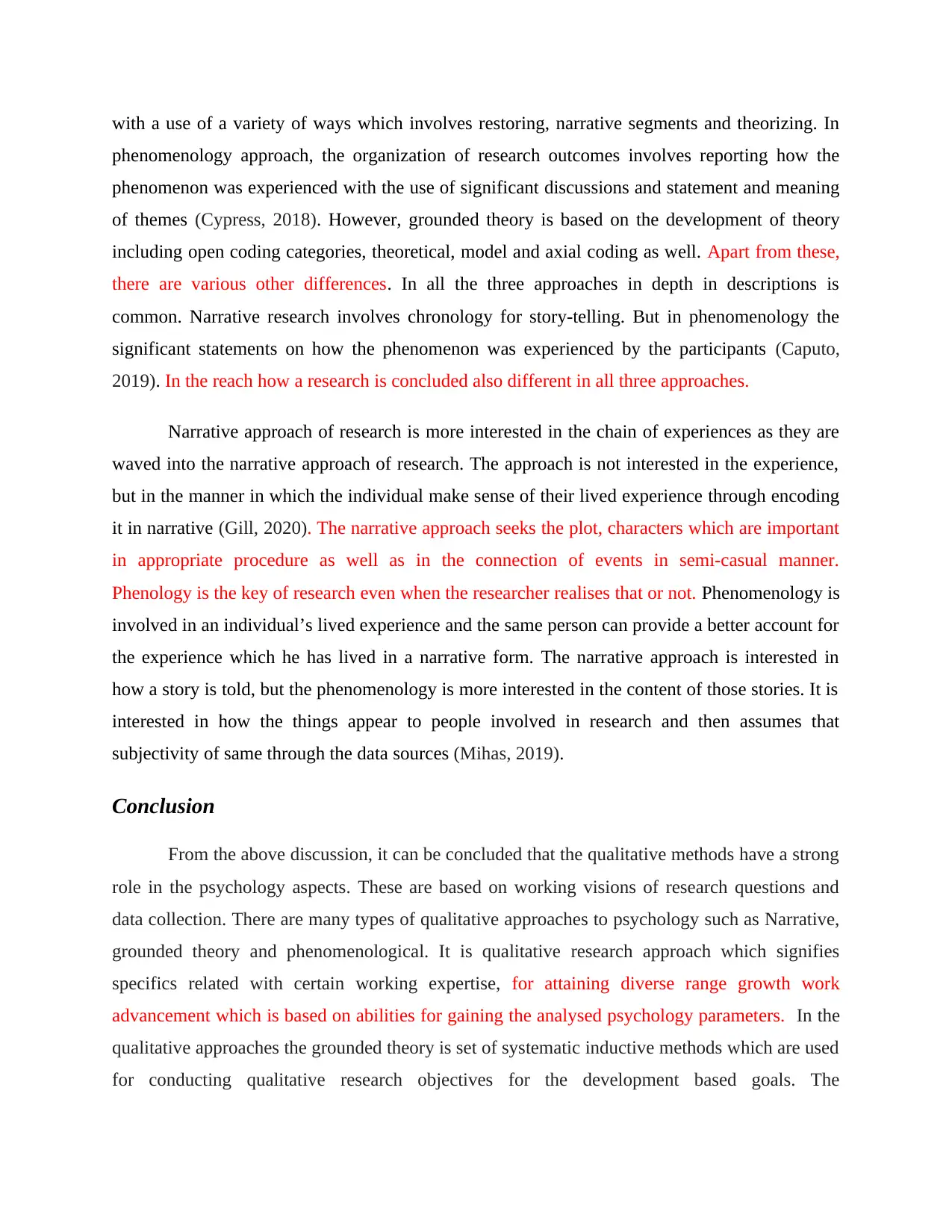
with a use of a variety of ways which involves restoring, narrative segments and theorizing. In
phenomenology approach, the organization of research outcomes involves reporting how the
phenomenon was experienced with the use of significant discussions and statement and meaning
of themes (Cypress, 2018). However, grounded theory is based on the development of theory
including open coding categories, theoretical, model and axial coding as well. Apart from these,
there are various other differences. In all the three approaches in depth in descriptions is
common. Narrative research involves chronology for story-telling. But in phenomenology the
significant statements on how the phenomenon was experienced by the participants (Caputo,
2019). In the reach how a research is concluded also different in all three approaches.
Narrative approach of research is more interested in the chain of experiences as they are
waved into the narrative approach of research. The approach is not interested in the experience,
but in the manner in which the individual make sense of their lived experience through encoding
it in narrative (Gill, 2020). The narrative approach seeks the plot, characters which are important
in appropriate procedure as well as in the connection of events in semi-casual manner.
Phenology is the key of research even when the researcher realises that or not. Phenomenology is
involved in an individual’s lived experience and the same person can provide a better account for
the experience which he has lived in a narrative form. The narrative approach is interested in
how a story is told, but the phenomenology is more interested in the content of those stories. It is
interested in how the things appear to people involved in research and then assumes that
subjectivity of same through the data sources (Mihas, 2019).
Conclusion
From the above discussion, it can be concluded that the qualitative methods have a strong
role in the psychology aspects. These are based on working visions of research questions and
data collection. There are many types of qualitative approaches to psychology such as Narrative,
grounded theory and phenomenological. It is qualitative research approach which signifies
specifics related with certain working expertise, for attaining diverse range growth work
advancement which is based on abilities for gaining the analysed psychology parameters. In the
qualitative approaches the grounded theory is set of systematic inductive methods which are used
for conducting qualitative research objectives for the development based goals. The
phenomenology approach, the organization of research outcomes involves reporting how the
phenomenon was experienced with the use of significant discussions and statement and meaning
of themes (Cypress, 2018). However, grounded theory is based on the development of theory
including open coding categories, theoretical, model and axial coding as well. Apart from these,
there are various other differences. In all the three approaches in depth in descriptions is
common. Narrative research involves chronology for story-telling. But in phenomenology the
significant statements on how the phenomenon was experienced by the participants (Caputo,
2019). In the reach how a research is concluded also different in all three approaches.
Narrative approach of research is more interested in the chain of experiences as they are
waved into the narrative approach of research. The approach is not interested in the experience,
but in the manner in which the individual make sense of their lived experience through encoding
it in narrative (Gill, 2020). The narrative approach seeks the plot, characters which are important
in appropriate procedure as well as in the connection of events in semi-casual manner.
Phenology is the key of research even when the researcher realises that or not. Phenomenology is
involved in an individual’s lived experience and the same person can provide a better account for
the experience which he has lived in a narrative form. The narrative approach is interested in
how a story is told, but the phenomenology is more interested in the content of those stories. It is
interested in how the things appear to people involved in research and then assumes that
subjectivity of same through the data sources (Mihas, 2019).
Conclusion
From the above discussion, it can be concluded that the qualitative methods have a strong
role in the psychology aspects. These are based on working visions of research questions and
data collection. There are many types of qualitative approaches to psychology such as Narrative,
grounded theory and phenomenological. It is qualitative research approach which signifies
specifics related with certain working expertise, for attaining diverse range growth work
advancement which is based on abilities for gaining the analysed psychology parameters. In the
qualitative approaches the grounded theory is set of systematic inductive methods which are used
for conducting qualitative research objectives for the development based goals. The
⊘ This is a preview!⊘
Do you want full access?
Subscribe today to unlock all pages.

Trusted by 1+ million students worldwide
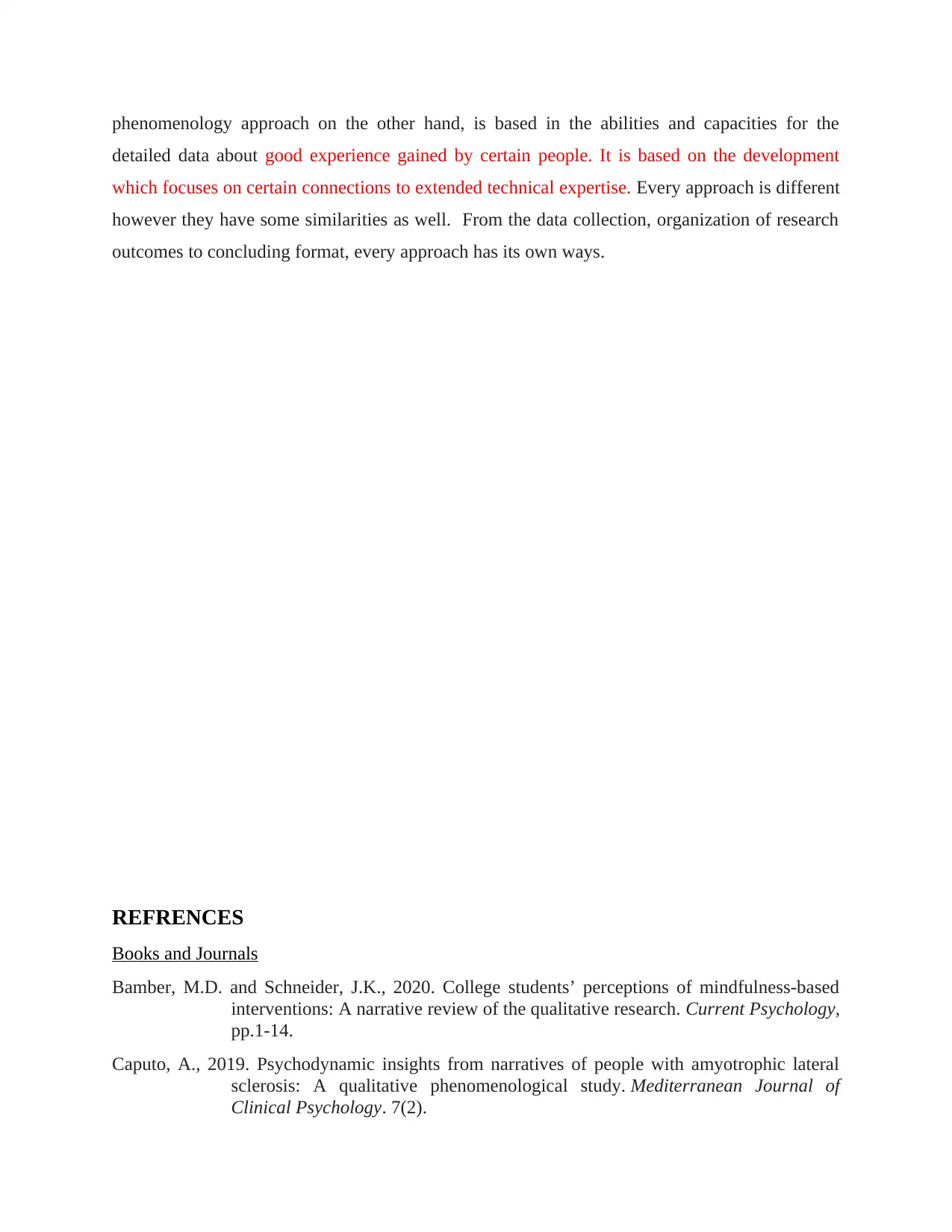
phenomenology approach on the other hand, is based in the abilities and capacities for the
detailed data about good experience gained by certain people. It is based on the development
which focuses on certain connections to extended technical expertise. Every approach is different
however they have some similarities as well. From the data collection, organization of research
outcomes to concluding format, every approach has its own ways.
REFRENCES
Books and Journals
Bamber, M.D. and Schneider, J.K., 2020. College students’ perceptions of mindfulness-based
interventions: A narrative review of the qualitative research. Current Psychology,
pp.1-14.
Caputo, A., 2019. Psychodynamic insights from narratives of people with amyotrophic lateral
sclerosis: A qualitative phenomenological study. Mediterranean Journal of
Clinical Psychology. 7(2).
detailed data about good experience gained by certain people. It is based on the development
which focuses on certain connections to extended technical expertise. Every approach is different
however they have some similarities as well. From the data collection, organization of research
outcomes to concluding format, every approach has its own ways.
REFRENCES
Books and Journals
Bamber, M.D. and Schneider, J.K., 2020. College students’ perceptions of mindfulness-based
interventions: A narrative review of the qualitative research. Current Psychology,
pp.1-14.
Caputo, A., 2019. Psychodynamic insights from narratives of people with amyotrophic lateral
sclerosis: A qualitative phenomenological study. Mediterranean Journal of
Clinical Psychology. 7(2).
Paraphrase This Document
Need a fresh take? Get an instant paraphrase of this document with our AI Paraphraser
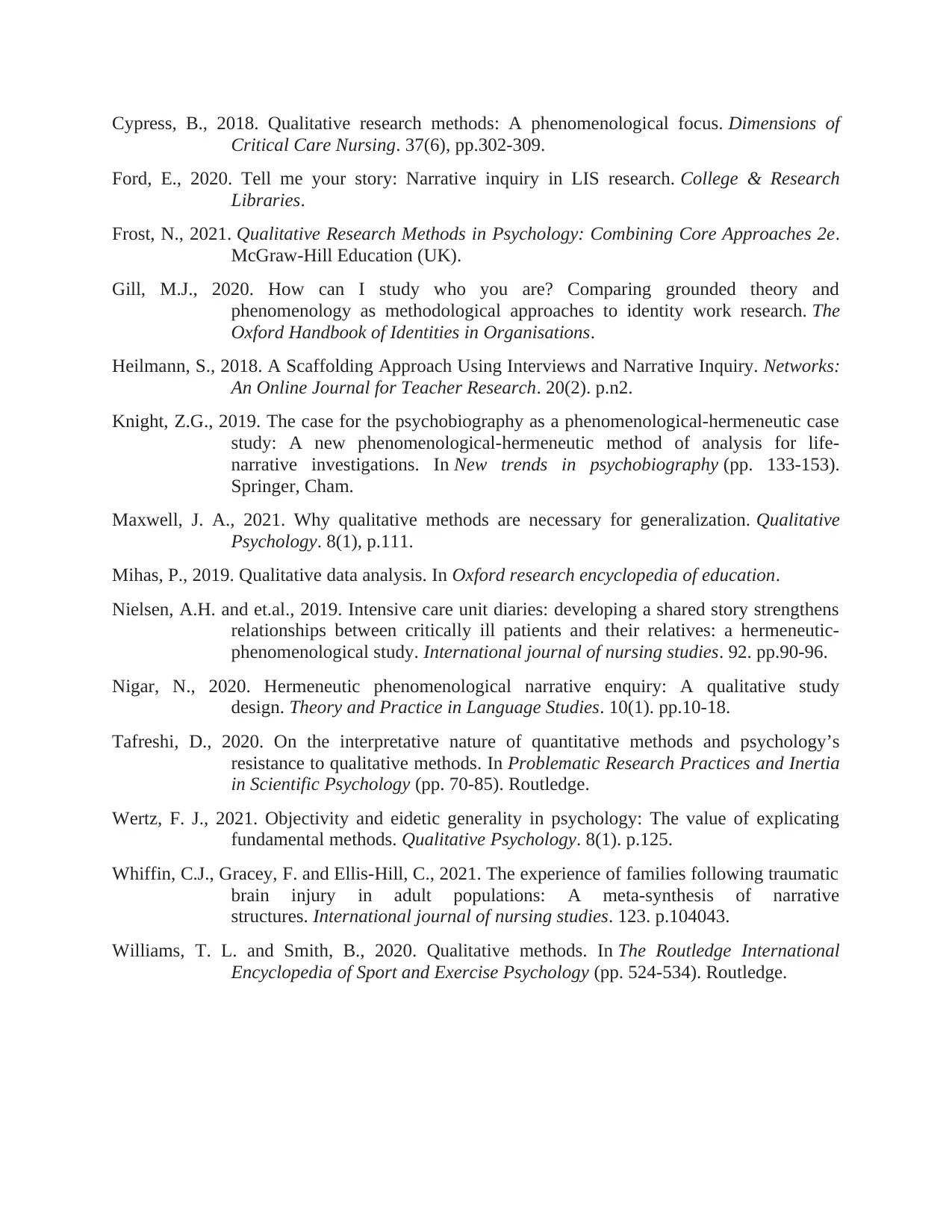
Cypress, B., 2018. Qualitative research methods: A phenomenological focus. Dimensions of
Critical Care Nursing. 37(6), pp.302-309.
Ford, E., 2020. Tell me your story: Narrative inquiry in LIS research. College & Research
Libraries.
Frost, N., 2021. Qualitative Research Methods in Psychology: Combining Core Approaches 2e.
McGraw-Hill Education (UK).
Gill, M.J., 2020. How can I study who you are? Comparing grounded theory and
phenomenology as methodological approaches to identity work research. The
Oxford Handbook of Identities in Organisations.
Heilmann, S., 2018. A Scaffolding Approach Using Interviews and Narrative Inquiry. Networks:
An Online Journal for Teacher Research. 20(2). p.n2.
Knight, Z.G., 2019. The case for the psychobiography as a phenomenological-hermeneutic case
study: A new phenomenological-hermeneutic method of analysis for life-
narrative investigations. In New trends in psychobiography (pp. 133-153).
Springer, Cham.
Maxwell, J. A., 2021. Why qualitative methods are necessary for generalization. Qualitative
Psychology. 8(1), p.111.
Mihas, P., 2019. Qualitative data analysis. In Oxford research encyclopedia of education.
Nielsen, A.H. and et.al., 2019. Intensive care unit diaries: developing a shared story strengthens
relationships between critically ill patients and their relatives: a hermeneutic-
phenomenological study. International journal of nursing studies. 92. pp.90-96.
Nigar, N., 2020. Hermeneutic phenomenological narrative enquiry: A qualitative study
design. Theory and Practice in Language Studies. 10(1). pp.10-18.
Tafreshi, D., 2020. On the interpretative nature of quantitative methods and psychology’s
resistance to qualitative methods. In Problematic Research Practices and Inertia
in Scientific Psychology (pp. 70-85). Routledge.
Wertz, F. J., 2021. Objectivity and eidetic generality in psychology: The value of explicating
fundamental methods. Qualitative Psychology. 8(1). p.125.
Whiffin, C.J., Gracey, F. and Ellis-Hill, C., 2021. The experience of families following traumatic
brain injury in adult populations: A meta-synthesis of narrative
structures. International journal of nursing studies. 123. p.104043.
Williams, T. L. and Smith, B., 2020. Qualitative methods. In The Routledge International
Encyclopedia of Sport and Exercise Psychology (pp. 524-534). Routledge.
Critical Care Nursing. 37(6), pp.302-309.
Ford, E., 2020. Tell me your story: Narrative inquiry in LIS research. College & Research
Libraries.
Frost, N., 2021. Qualitative Research Methods in Psychology: Combining Core Approaches 2e.
McGraw-Hill Education (UK).
Gill, M.J., 2020. How can I study who you are? Comparing grounded theory and
phenomenology as methodological approaches to identity work research. The
Oxford Handbook of Identities in Organisations.
Heilmann, S., 2018. A Scaffolding Approach Using Interviews and Narrative Inquiry. Networks:
An Online Journal for Teacher Research. 20(2). p.n2.
Knight, Z.G., 2019. The case for the psychobiography as a phenomenological-hermeneutic case
study: A new phenomenological-hermeneutic method of analysis for life-
narrative investigations. In New trends in psychobiography (pp. 133-153).
Springer, Cham.
Maxwell, J. A., 2021. Why qualitative methods are necessary for generalization. Qualitative
Psychology. 8(1), p.111.
Mihas, P., 2019. Qualitative data analysis. In Oxford research encyclopedia of education.
Nielsen, A.H. and et.al., 2019. Intensive care unit diaries: developing a shared story strengthens
relationships between critically ill patients and their relatives: a hermeneutic-
phenomenological study. International journal of nursing studies. 92. pp.90-96.
Nigar, N., 2020. Hermeneutic phenomenological narrative enquiry: A qualitative study
design. Theory and Practice in Language Studies. 10(1). pp.10-18.
Tafreshi, D., 2020. On the interpretative nature of quantitative methods and psychology’s
resistance to qualitative methods. In Problematic Research Practices and Inertia
in Scientific Psychology (pp. 70-85). Routledge.
Wertz, F. J., 2021. Objectivity and eidetic generality in psychology: The value of explicating
fundamental methods. Qualitative Psychology. 8(1). p.125.
Whiffin, C.J., Gracey, F. and Ellis-Hill, C., 2021. The experience of families following traumatic
brain injury in adult populations: A meta-synthesis of narrative
structures. International journal of nursing studies. 123. p.104043.
Williams, T. L. and Smith, B., 2020. Qualitative methods. In The Routledge International
Encyclopedia of Sport and Exercise Psychology (pp. 524-534). Routledge.
1 out of 8
Related Documents
Your All-in-One AI-Powered Toolkit for Academic Success.
+13062052269
info@desklib.com
Available 24*7 on WhatsApp / Email
![[object Object]](/_next/static/media/star-bottom.7253800d.svg)
Unlock your academic potential
Copyright © 2020–2026 A2Z Services. All Rights Reserved. Developed and managed by ZUCOL.





